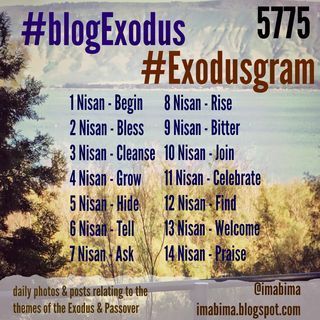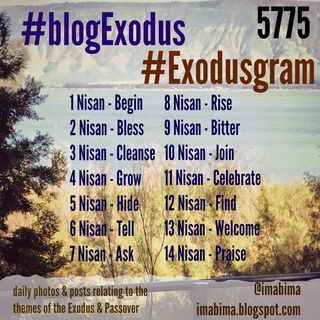Rachel Barenblat's Blog, page 131
April 6, 2015
Day 2 of the Omer
DAY 2 - IN THE BEGINNING
Let Me be known! God said,
and amino acids bloomed
in the amniotic sea.
A semi-permeable membrane
divided waters outside
from waters inside.
The ribosomes received
their names and tasks
and it was good.
But restive creation
hungered for knowledge
the womb couldn't provide.
Eden pushed us out
through narrow straits.
We can't go back.
Sometimes we wail.
This world's manna
isn't what we remember.
But a crackle of matzah
a drop of seder wine
quiets our cries
reminds us of heaven.
Let this waybread be enough
for our great journey
toward the One Who flows
with milk and honey,
Who yearns to be revealed.
Today is the second day of the Omer, the second day on our journey between Pesach and Shavuot, liberation and revelation.
(Again, I mean "today" in the Jewish sense; the second day of the Omer began on Sunday evening at sundown, and will end on Monday evening at sundown. I'm posting these poems in the morning, and those of you who receive them via email subscription are probably getting them around East Coast dinnertime, toward the end of this "day" of the counting.)
One of my favorite Hasidic teachings about God is that God created because God yearned to be known. This poem also plays with images from Bereshit (Genesis) -- God's creation of the universe, and also the expulsion of the first humans from Eden -- as well as images from scientific description of life.
Torah describes the ancient Israelites wailing in the desert, missing the certainties of servitude. What do we miss about what we've left behind? Can this heightened time in our religious year bring us comfort?
Shavuot, the end of this 49-day journey, is when we celebrate the revelation of Torah. Torah is likened to milk and honey. It's also considered, in Jewish tradition, the way we come to know God. What will we receive this year when we stand at the foot of Sinai and open ourselves to what comes?
April 5, 2015
Day 1 of the Omer
DAY 1: ONE STEP
The Egyptian sky
was a goddess
doing a backbend.
Once we crossed
the watery barrier
she gave way
and the heavens
became sapphire floor
beneath the throne.
And we stood
by the sea
and sang praises
because what else
could we do,
we who survived?
Here we are
again, shaking off
salt water tears
on a shore
we've never seen.
There's no map.
Above us, miles
of air stretching
to kiss vacuum:
all that freedom
impossible to bear
sometimes. Too much
depends on us.
Last night's maror
stings our eyes.
Ahead: uncharted space,
the holy wilderness
of the heart.
Take one step
into the labyrinth.
Leave Egypt behind.
Today is the first day of the Omer -- the measured period of 49 days which we count between Pesach and Shavuot, between liberation and revelation. Over the next seven weeks I'll be sharing daily poems which are intended to open new windows into the spiritual journey of counting the Omer.
(I mean "today" in the Jewish sense. A Jewish day begins and ends at sundown. So today, the first day of the Omer, began Saturday evening at sundown, and will end this evening at sundown. Many people count the Omer at sundown, when the "day" is new. But I'll be sharing these daily Omer poems in the morning.)
"The Egyptian sky / was a goddess / doing a backbend" -- one of the deities in the Egyptian pantheon was Nut, sometimes depicted as a star-covered woman arching over the earth.
"[T]he heavens / became sapphire floor / beneath the throne" -- see parashat Mishpatim and its description of the floor beneath the divine throne as being like sapphire. The idea of the sky changing as the prevailing beliefs change also owes a debt to Elizabeth Bear's Eternal Sky books.
Today we take our first step on the journey between Pesach and Shavuot. What are we headed toward? What are we leaving behind?
April 4, 2015
For NaPoWriMo 4: a love poem
RIVER
All winter I went on my way
beneath thick ice.
Then life upended,
great plates melting
and now I overflow my banks.
How did I forget
how strong my current?
I want to sweep you away.
Today's NaPoWriMo prompt is to write a love poem which never mentions love.
Mine is inspired by watching the Green River in Williamstown as it does its annual spring thing.
[image error]April 3, 2015
For #blogExodus 13: Welcome (and NaPoWriMo 2: a poem about stars)
CONSTELLATION
Tonight's moon obscures most stars from view, but
I want to rename the ones that remain: turn
the huntsman into the man who stood up to Pharoah
even when his syllables faltered, the dipper
into a mikveh for washing away what hurts.
The great wheel of the galaxy is an angel,
and the fiery heart of every nebula unfolding...
Friday night angels and seder constellations:
bring us the wholeness of knowing that our bonds
are already broken, that freedom is already here.
Today's #blogExodus prompt is "Welcome," which made me think both of welcoming seder guests, and of welcoming the Shabbat angels who -- tradition says -- join us every Friday night as we make Shabbat. (And tomorrow night will be both Shabbat and the first seder.)
Today's #NaPoWriMo prompt is to write a poem inspired by the stars. Last night I stood outside for a little while and noticed the moon and the stars...
Today's poem is a response to both of those prompts.
#blogExodus 14: Praise
PRAISE
Can I offer it with all that I am?
Not despite my fears
that those around my seder table
will be checking their watches,
the nagging sense that I presume
simply by being as Jewish as I am
simply by being --
-- but with those shadows
kindle a light
to shine to the ends of the earth?
In the furrows of my cracked heart
I plant seeds of gratitude.
Eternal One, open my lips
that I might sing Your praise.
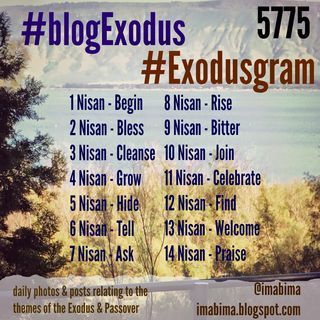 The final #blogExodus prompt is "praise." When I began to write this morning, this is what emerged.
The final #blogExodus prompt is "praise." When I began to write this morning, this is what emerged.
To those who are celebrating Pesach tonight and tomorrow night: may your seders be sweet and meaningful.
To those who are celebrating Easter on Sunday: may your day be filled with alleluias.
To everyone: this year may we find the liberation we most deeply need, and may it spark us to do the work of liberating others.
Shabbat shalom and chag sameach.
[image error]April 2, 2015
For #blogExodus 12: Welcome (and NaPoWriMo 2: a poem about stars)
CONSTELLATION
Tonight's moon obscures most stars from view, but
I want to rename the ones that remain: turn
the huntsman into the man who stood up to Pharoah
even when his syllables faltered, the dipper
into a mikveh for washing away what hurts.
The great wheel of the galaxy is an angel,
and the fiery heart of every nebula unfolding...
Friday night angels and seder constellations:
bring us the wholeness of knowing that our bonds
are already broken, that freedom is already here.
Today's #blogExodus prompt is "Welcome," which made me think both of welcoming seder guests, and of welcoming the Shabbat angels who -- tradition says -- join us every Friday night as we make Shabbat. (And tomorrow night will be both Shabbat and the first seder.)
Today's #NaPoWriMo prompt is to write a poem inspired by the stars. Last night I stood outside for a little while and noticed the moon and the stars...
Today's poem is a response to both of those prompts.
April 1, 2015
#blogExodus 12: Find - and #NaPoWriMo 1!
FIND
If I had any pull with God, everything you need
would appear right now in front of you.
A door would open and inside it
a rose-strewn path, the yearned-for embrace.
I'd take the broken pieces of the afikomen
and restore them as if by magic.
But that isn't how it works. God isn't
a diner waitress saying what can I get you, hon?
That's why our sages taught: a clay vessel
is purified when it breaks and is glued.
A human heart, charged with a lifetime's losses
becomes real when lovingly mended.
All I can do: ask God to cradle your heart
in Her own hands and make you whole.
For today's #blogExodus prompt, "Find," I decided to write a poem, since today is also the first day of NaPoWriMo (National Poetry Writing Month.)
The afikomen is the ceremonial middle matzah, broken during the seder. Half is hidden, and the seder cannot conclude until it is found.
The stanza about our sages and a clay vessel is a reference to classical teachings about how to make a clay vessel which has become tamei (charged-up or "impure") become tahor ("pure") again.
To me that teaching has always held an internal / emotional resonance too.
March 31, 2015
Tefilat Tal / Prayer for Dew
On the first day of Pesach we change one line in our daily prayers: instead of asking God for rain, we ask God for dew. It's also traditional to recite a prayer specifically for dew. A few years ago I wrote a d'var tefilah ("word about prayer") on the prayer for dew; in this post you'll find an English-language variation on that prayer, intended for community use as a responsive reading.
Give us dew to favor Your earth;
sweeten the land in which we live with dew.
Strengthen us with plenty, with grain and wine:
sheaves and vines sustained by dew.
Bring wholeness to the Holy City and to all who love her
as flowers are renewed by dew.
You have said "I will be like dew to Israel;"
1
may Your mercy well up in us like the dew.
Let the proud and beautiful fruits of our harvest
be sustained and graced with dew.
Open our hearts; make us into open vessels
to receive the spiritual gifts of dew.
May a light shine forth from darkness to draw us to You,
as a root finds water from dew.
We are the people who followed You through the desert
as sheep follow a trusted shepherd; favor us with dew.
You are our God, Who causes the wind to blow and the dew to fall.2
For blessing and not for curse. Amen.
For life and not for death. Amen.
For plenty and not for lack. Amen.
1. Hosea 14:5↩
2. From the daily amidah.↩
[image error]#blogExodus 11: Celebrate
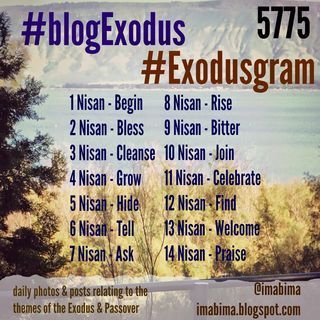 Spring is an easy time for me to celebrate. I love the longer days which are beginning to come. I love the promise of tender living green -- for now just a promise, since it's still too cold here anything to grow outside, but I know it's coming.
Spring is an easy time for me to celebrate. I love the longer days which are beginning to come. I love the promise of tender living green -- for now just a promise, since it's still too cold here anything to grow outside, but I know it's coming.
I love Pesach, with its reminder that liberation is here in every moment; its opportunity to gather with loved ones around a shared table; its instruction to share our bounty, both practical and spiritual, with those who hunger and thirst.
Seder is a celebration. A celebration that we're still here, still telling our ancestral story of freedom. A celebration of family and friendship and connection. (And I know that I'm blessed to have family and friends around my seder table.)
Seder is a celebration of the narrative that holds us together. Once we were slaves and now we are free. We cried out to God from the Narrow Place, and God responded to us with expansiveness. Seder is a celebration because the work of creating liberation is infinite, but that's no reason not to pause and give thanks for how far we've come before we rededicating ourselves to continuing.
One of my favorite teachings in my haggadah is that if we wait until we feel fully ready, we might never leap at all. But the same holds true for celebration. If we wait until the work is complete, until everyone is free both physically and spiritually, until creation is redeemed, we might never get to celebrate. The rhythm of our liturgical year teaches us to pause and celebrate -- every week; every month; at every festival. The soul needs to celebrate, to feel and articulate gratitude and joy.
"This is the day that God has made; let us rejoice and be glad in it!" (That's Psalm 118:24.) This -- right here; right now -- is the day which God is making. God is telling every atom in the universe to exist, to be, right here, right now. This is the day -- not some other day you're looking forward to, not some other day you're dreading, but this day right now. God is making this day. It's our job to find a way to celebrate: not what was, not what we hope might someday be, but what is, right here, right now.
Sometimes we don't feel like celebrating. Sometimes our bodies aren't up to it. Sometimes our hearts or our spirits aren't up to it. Sometimes celebration seems impossible. But Pesach invites us to discern how we may come to feel liberated, even if we are still living within constraints. How we may feel released from slavery, even if we are still struggling with loss or with grief. How we may be able to celebrate what we have, even if it is not everything we might wish for.
This post is part of #blogExodus, a daily carnival of posts / tweets / status updates relating to themes of Passover and Exodus, created by ImaBima. Find other posts via the #blogExodus hashtag.
[image error]March 30, 2015
#blogExodus 10: Join
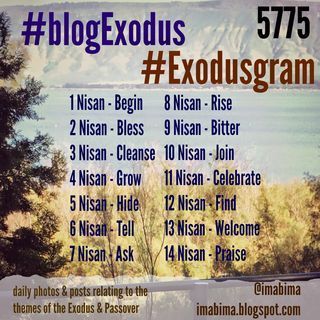 One of my favorite teachings about the Exodus from Egypt is that we didn't leave Mitzrayim, that Narrow Place, by ourselves. A mixed multitude -- in Hebrew, an ערב רב –– came with us. (That's from Exodus 12:38.)
One of my favorite teachings about the Exodus from Egypt is that we didn't leave Mitzrayim, that Narrow Place, by ourselves. A mixed multitude -- in Hebrew, an ערב רב –– came with us. (That's from Exodus 12:38.)
One interpretation holds that those who joined us in leaving the Narrow Place were Egyptians who had intermarried into the Jewish community and wanted to remain with us. They had chosen to connect themselves with our community.
It's also possible that others joined the throng for other reasons. Perhaps they had felt constrained in their existing lives, and needed change. Perhaps they had suffered oppression and resonated with God's call to freedom.
One story holds that Pharaoh's daughter came along, too -- and in so doing changed her name from bat Pharaoh, the (otherwise nameless) "daughter of Pharaoh," to Batya," daughter of God." Perhaps everyone who joins in the walk toward liberation is a child of God.
One way or another, I love that here in our most central story -- the story which we remember in daily prayer and in the Friday night kiddush and at the Pesach seder table -- liberation is not for us alone. This is not an insular experience, open only to those with the right credentials. Freedom is here for anyone who wishes to join us. Join the mixed multitude, the motley crew, in hoping for a better world.
Of course, you have to be willing to join not only in the fun parts, but also in the difficult ones. The joyous march toward freedom leads us inexorably to Sinai, to covenant with God and to the system of mitzvot which guide our lives. You have to be willing to join us in heeding Torah's imperative to feed the hungry, to clothe the naked, to care for the powerless, to love the stranger.
But freedom isn't ours alone. God isn't ours alone. Even revelation isn't ours alone -- my teacher Reb Zalman z"l taught that God broadcasts on all channels and each religious tradition hears the revelation to which it is attuned. If you want to join us in seeking to heal the world, pull up a chair and join the table, and let our story be your story too. "Let all who are hungry, come and eat."
Every year we pray that next year we may merit to celebrate Pesach in a world redeemed. And the only way to get it together, as Reb Zalman famously taught, is together. The only way we're going to repair the world is if we collaborate: each tradition bringing its unique gifts to the table; each person lifting up the holy sparks which only she can lift, teaching the Torah which is uniquely his to share.
This post is part of #blogExodus, a daily carnival of posts / tweets / status updates relating to themes of Passover and Exodus, created by ImaBima. Find other posts via the #blogExodus hashtag.
If the idea of collaborating with other religious traditions to repair the world speaks to you, consider joining ALEPH for this summer's "Getting It... Together" weekend, July 3-5, which will feature a variety of amazing people and experiences. Click the link to read all about it.
[image error]Rachel Barenblat's Blog
- Rachel Barenblat's profile
- 6 followers


